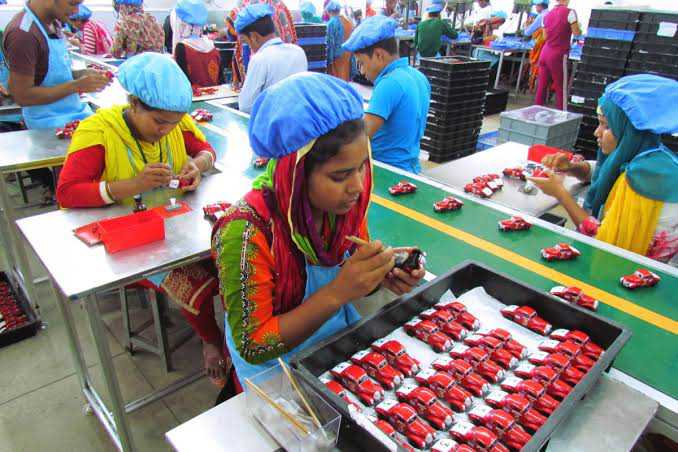Bangladesh has second most GOTS-confirmed manufacturing plants

Image collected
Internationally, the quantity of offices affirmed by the GOTS rose 14.6% to 5,760 out of 2018 and Bangladesh proceeded with its second position here. Bangladesh has the second most GOTS-guaranteed production lines worldwide with 689 offices, simply behind India with 1973 processing plants.
In the nation, the quantity of all around perceived material industrial facilities, which utilize natural crude materials, rose 29% a year ago, with the development rate being most elevated all inclusive.
Rahul Bhajekar, GOTS Managing Director shared this data at a workshop sorted out by Global Organic Textile Standard (GOTS) on eighth September 2019. The day-long worldwide class with the subject of 'Interfacing for Success', was composed at the International Convention City Bashundhra (ICCB) in Dhaka, Bangladesh. The class tended to the problems that are begging to be addressed pertinent to the natural material industry.
The workshop was structured in 4 sessions including slide show introduction, question-answer and with a board exchange. The first session directed on 'Supportable Retail: Stories from Fashion Industry'. Claudia Kersten, GOTS Managing Director, Germany, was available as the mediator of this session.
This session presented the ongoing patterns, needs and experience of cognizant purchasers. The session likewise included point of view from worldwide brands and retailers, sourcing from Bangladesh.
Bruno Van Sieleghem, Stanley and Stella S.A., Belgium and Jan Moritz, Julius Hüpeden GmbH, Germany were available as the speaker.
The second session hung on 'Specialized Criteria and Implementation' where Rahul Bhajekar, GOTS Managing Director conveyed an introduction on this session. The session was led on the necessities for the standard have reliably been advancing to keep pace with specialized research and market prerequisites.
The session was about the most recent criteria of specialized standard of GOTS. It further displayed the encounters from execution accomplices for specialized parts of the standard.
Rahul Bhajekar, talks on GMO testing convention, ISO IWA 32 – Technical Details and Impacts and he additionally demonstrated Central Database System – Enhanced Traceability in GOTS store network.
'GOTS Criteria – Fiber Composition and Technical Requirements' was another subject of this session led by Sumit Gupta, Deputy Director Standards Development and Quality Assurance,
The last talk in this session was 'Prologue to GOTS Monitor (water/vitality) Tool' by Prachi Gupta, Prachi Gupta, Expert Quality Assurance and Impact, GOTS.
In a response to an inquiry Rahul Bhajekar stated, "GOTS never determine or advance any research center for GMO testing however they ought to adhere to GOTS standard."
"GOTS has clear review prerequisite so for any examination how much time will be required or what number of individuals ought to need to draw in for review reason that will rely upon examiner's interest," he said while answering to an inquiry.
Usage of GOTS apparatuses at times costly and associated with gigantic venture, in answer to this inquiry Sumit Gupta stated, "GOTS has claim standard and specialized devices and I think, following the GOTS routine will be useful to diminish cost."
The third session was on subject 'Interfacing at work: Workers and Management'. With a board exchange, directed by Herbert Ladwig, Policy and Legal Advisor, GOTS, Germany, this session attempted to investigate the working conditions at the pieces of clothing (and other) manufacturing plants in Bangladesh for a significant association and solid ties among laborers and production line proprietors for common development.
This session likewise a push to interface significant partners in the field of social consistence in light of the fact that the social discussion is immense, and the session principally secured aggregate haggling and grumbling techniques.
Armanul Azim, Tosrifa Industries Limited, Bangladesh; Dr. Uttam Kumar Das, Advocate, Supreme Court of Bangladesh and Abdul Mottaleb, CERES Bangladesh were available as the specialists in this session.
The fourth and last session was on 'Associating Supply Chain Partners: Efficient Partnerships for Successes'. This session centered to associate the key inventory network accomplices and talked about their separate difficulties and openings. The speaker's accentuation on manageability standard scene that consistently developing and showing new difficulties.
Montashir Nahid, GIZ, Bangladesh was the mediator in this board talk while Md. Humayun Kabir, Sr. Administrator, Quality Assurance, Zaber and Zubair Fabrics Ltd. Bangladesh; Md. Sazzad Hossain, Manager coloring, Fakir Knitwears Ltd., Bangladesh; Nandana Prasad Hettiarachchi, Pacific Jeans Ltd., Bangladesh; Naishad Desai, Britacel Silicones Ltd, India and Dr. Binay Choudhury, Control Union Certification, India were available as the speaker in this session.
The speakers brought up certain difficulties for the usage of GOTS routine in the board exchange. These are:
1.Traceability of natural materials in the creation unit
2.Monitoring of the natural procedure
3.Organic synthetic administration
4.Long lead time of natural crude materials
5.Organic stock is tedious.
"Legitimate preparing and information reservation are basic to look after discernibility," said Md. Sazzad Hossain, Manager Dyeing, Fakir Knitwears Ltd. Bangladesh.
He educated Fakir Knitwears Ltd is putting a standardized tag on the coloring clump rather than yellow imprint. The scanner tag is giving subtleties data to the group and this is lessening additional hand to do yellow checking.
Various 250 senior personals from up to 150 distinctive industry associations and organizations were available in the course.
Tags :
Previous Story
- Develop bond market to finance infrastructure projects: experts
- Tough times for the apparel industry: BGMEA president
- TCL to take on Galaxy Fold with innovative...
- Extreme occasions for the attire business: BGMEA president
- More government support sought for SME sector
- NY State senators keen to boost investment in...
- Stocks narrowly end 3-week losing streak
- How to turn your passion for art into...